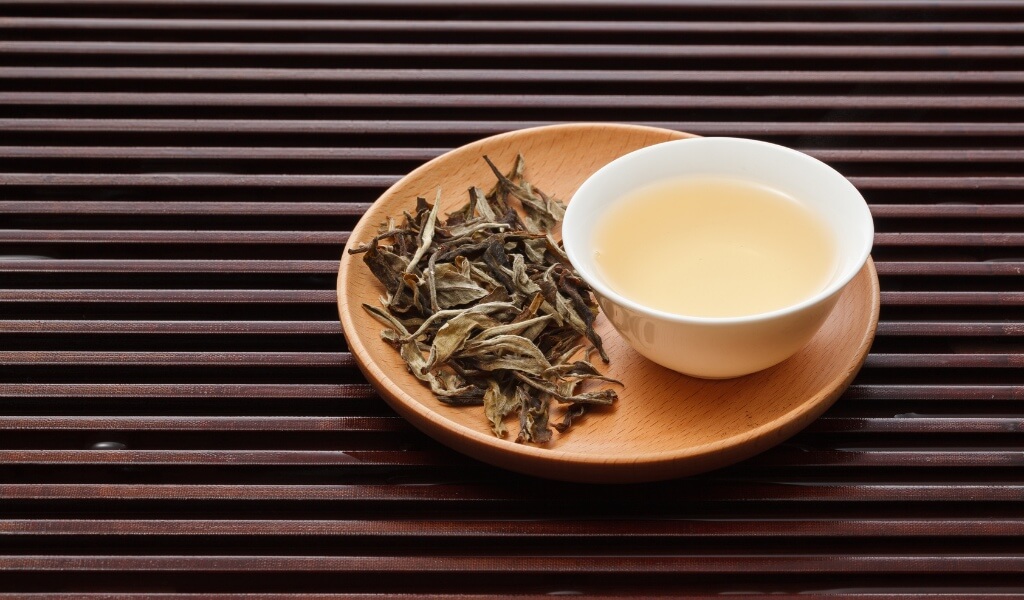As a seasoned tea drinker, I’ve found the health benefits of White tea to be truly impressive.
It’s not just the delicate flavor that entices me but the array of wellness-promoting properties it brings to each cup.
Quotes of tea with You
“The privileges of the side-table included the small prerogatives of sitting next to the toast, and taking two cups of tea to other people’s one.”
― Charles Dickens, Martin Chuzzlewit
Nutrition Information
Tea, in all its varieties, is a treasure trove of nutrients, and white tea is no exception. White tea has many beneficial compounds, like its green and black counterparts. Let’s take at what’s inside a cup of this amazing brew.
Detailed Analysis of Nutrients Contained in White Tea
Brewing a cup of White tea yields a drink practically free of calories, protein, fat, carbohydrates, fiber, and sugar. But don’t let these zeroes fool you. The true value of White tea lies beyond these macronutrients.
White tea may not contribute to your daily intake of fats or proteins, but it’s a powerhouse of antioxidants in White tea, such as polyphenols, flavonoids, and tannins. Thanks to its minimal processing, it boasts higher levels of these beneficial compounds than many other tea varieties.
Comparison of White Tea with Other Teas
White tea is generally considered more subtle in flavor but superior in antioxidant content due to its minimal processing. While green tea extract, one of the popular camellia sinensis, is known for its catechin content and black tea for its theaflavins, White tea stands out with its high polyphenols. But does white tea have caffeine? Its caffeine content is also typically lower than other teas, making it a great choice for those looking to cut down on caffeine.
Health benefits of White Tea
So, is white tea good for you? what is White tea good for? Here are the main highlights of white tea for you to consider:
| Health Benefit | Summary |
| Rich in Antioxidants |
White tea’s polyphenols, like catechins, act as antioxidants, protecting cells from damage.
|
| May Reduce Risk of Heart Disease |
Polyphenols in white tea support blood vessels, immunity, and lower bad cholesterol.
|
| Weight Loss |
White tea enhances metabolism, aids fat breakdown, and may help with weight loss.
|
| Protects Teeth from Bacteria |
Fluoride, catechins, and tannins combat bacteria and plaque, promoting dental health.
|
| Potential Cancer Protection |
White tea’s compounds inhibit cancer cell growth, but more research is needed on humans.
|
| Lowers Risk of Insulin Resistance |
Polyphenols in white tea may help manage blood sugar levels and reduce insulin resistance.
|
| Supports Bone Health | Catechins in White tea promote bone growth and counter osteoporosis risk factors. |
| Benefits Skin Health | White tea compounds protect skin from UV damage and aging effects, internally and externally. |
| Potential for Parkinson’s and Alzheimer’s Protection | EGCG in White tea may reduce risk of neurodegenerative diseases by countering inflammation. |
| Easy to Prepare | Preparing White tea is simple: steep loose leaves in hot water for a refreshing taste. |
| Anti-Inflammatory Effects |
White tea’s polyphenols have potent anti-inflammatory effects, promoting overall well-being.
|
| Dental Health | White tea strengthens teeth, fights bacteria, and supports gum health for a brighter smile. |
| Improved Brain Health | White tea protects against oxidative stress, reducing neurodegenerative disease risk. |
| Diabetes Management | Catechins in White tea help regulate blood sugar levels, aiding in Type 2 diabetes control. |
| Enhances Energy and Alertness | High L-theanine content in White tea boosts alertness, reduces fatigue, and improves mood. |
| Kidney Health | Studies suggest White tea may have protective effects on kidneys and reduce negative impact. |
| Reproductive Health | White tea extract may enhance male reproductive health, according to a Portuguese study. |
| Memory Enhancement | Antioxidants in white tea, including catechins, support memory and may slow memory decline. |
It’s Rich in Antioxidants
White tea is replete with polyphenols, offering numerous antioxidant advantages. These aid in mitigating chronic inflammation by shielding the body from harm caused by free radicals.
Think of White tea as a trove of antioxidant wonders, particularly a group of polyphenols known as catechins. If you’re wondering what polyphenols are, they’re simply plant-based powerhouses that perform the role of antioxidants in our bodies. They’re like our body’s personal security team, shielding our cells from harmful compounds known as free radicals.
Just imagine – if free radicals were allowed to run rampant, they could cause some serious mischief. They’re linked to unwanted signs of aging, persistent inflammation, weakened immunity, and diseases we’d all rather avoid.
Luckily for us, White tea is a free radical-fighting superhero. It’s been suggested that it is on par with green tea, a well-known health champion, regarding its antioxidant benefits.
Although mostly conducted in test tubes, scientific studies paint an encouraging picture. For instance, one study found that White tea extract could guard animal nerve cells against harm from a particularly pesky free radical, hydrogen peroxide.
Another study showed that White tea powder significantly reduced inflammation caused by free radicals in human skin cells. That’s right; White tea might even have your skin’s back!
While these test-tube findings are certainly exciting, we need more research on humans to understand White tea’s antioxidant power fully. But for now, it’s safe to say that sipping on white tea could be a step in the right direction for our health.
May Reduce the Risk of Heart Disease
Polyphenols, such as those present in White tea, could aid in dilating blood vessels, enhancing immune function, and inhibiting the oxidation of harmful cholesterol. These aspects might contribute to reducing the probability of heart disease.
Heart disease is, unfortunately, the top cause of death in the United States. It’s closely tied to chronic inflammation, which is influenced by various factors, including our diet, physical activity, and lifestyle choices such as smoking.
Here’s where the polyphenols in White tea step into the picture. These little heroes may help decrease the risk of heart disease in multiple ways.
Research has shown that polyphenols can help to ease the tension in our blood vessels and give our immunity a welcome boost. That’s not all, though. They’ve also been found to prevent “bad” LDL cholesterol from oxidizing – an issue that can increase heart disease risk.
When scientists looked closely at five studies, they found something quite heartening. People who enjoyed three or more cups of tea daily had a 21% reduced risk of heart disease.
These findings hint that white tea could be a potential ally in lowering heart disease risk. However, it’s just one piece of the puzzle.
For a truly heart-healthy lifestyle, we should also eat more fruits and veggies, make time for regular exercise, and ensure we get enough sleep. So, enjoy that cup of White tea, but don’t forget the other pieces that make up the heart health picture.
White tea weight loss
Studies have shown that White tea, specifically, has the potential to boost metabolism by an extra 4-5%, resulting in the consumption of around 70-100 additional calories daily. Additionally, the polyphenols found in White tea assist in fat breakdown and deter the creation of new fat cells.
Green tea might be the first to pop into your mind when considering teas for weight loss. However, don’t overlook the white tea shot; it could be equally potent in helping to shed those extra pounds.
Both teas share similar quantities of caffeine and catechins, such as epigallocatechin gallate (EGCG) – a compound tied to fat burning in green tea. These two compounds work together, creating a fantastic fat-fighting duo.
Let’s dive a little deeper. In one test-tube study, White tea extract showed some promising results: it revved up the breakdown of fat and put a stop sign on creating new fat cells; big thanks to our friend, EGCG.
Moreover, a roundup of several studies suggests that White tea could kick your metabolism up a notch, increasing it by about 4–5%. That might not seem like much, but it could mean torching an additional 70–100 calories daily.
It’s worth mentioning that White tea hasn’t gained significant attention as a weight loss solution just yet. Since it’s not as commonly consumed, further research is needed to understand its potential for long-term weight loss benefits fully. Nevertheless, this remains an interesting area for further investigation. Therefore, if you’re considering a beverage to aid in weight loss, why not experiment with White tea next time?
Help Protect Your Teeth from Bacteria
White tea is a rich reserve of Fluoride, Catechins, and Tannins. Various research initiatives have indicated that these compounds can combat bacteria responsible for dental plaque formation.
Did you know that White tea is a secret weapon for dental health? It’s loaded with fluoride, catechins, and tannins, a trio that works together to boost your teeth.
Here’s how it works: fluoride strengthens your teeth’s defenses, making them more resistant to acid attacks when bacteria party with sugar on your teeth. This extra layer of protection can help ward off those pesky dental cavities
Fluoride doesn’t act in isolation here. Catechins, which are abundant antioxidants in White tea, play a role in controlling plaque bacteria. Think of them as the security team in your mouth, making sure things don’t spiral out of control.
Additionally, we shouldn’t overlook Tannins, another type of Polyphenol in White tea. They collaborate with fluoride to enhance the prevention of plaque-causing bacteria. So, each sip of white tea not only offers a soothing moment but also contributes to promoting healthier Teeth.
Has Compounds That May Fight Cancer
Studies conducted in test tubes have demonstrated that White tea extract inhibited various Cancer cell types and curbed their spread. Nevertheless, more investigations involving humans are necessary to substantiate these findings.
Sadly, Cancer is the second leading cause of death in the United States. But let’s talk about something a bit more hopeful. Several laboratory studies suggest that White tea might have properties that fight against Cancer.
In one of these studies, White herbal tea extract seemed to call curtains on several types of Lung Cancer cells. Isn’t that fascinating?
Another pair of studies focused on colon Cancer cells. They found that White tea extract stopped the growth of these cells and prevented them from spreading. Plus, the antioxidants in the extract stepped up to protect normal cells from damage by harmful molecules.
Little disclaimer: these lab studies used a hefty amount of White tea. So, while these findings are promising, we need more human research to fully understand what White tea can do in the fight against cancer. Until then, it’s comforting to know that your cup of White tea might be doing more than just soothing your senses.
May Lower the Risk of Insulin Resistance
Insulin resistance, tied to many Chronic Diseases, can potentially be mitigated by the Polyphenols found in White tea, improving Blood Sugar control. Your White tea might be a small but potent health ally!
Insulin is a vital hormone, acting like a delivery service, moving nutrients from our bloodstream to our cells where they’re needed or stored. But sometimes, due to factors like high Sugar consumption, our bodies might stop responding to Insulin. This is known as Insulin resistance.
Insulin resistance is unfortunately common and is connected to several chronic health conditions, including type 2 Diabetes, Heart Disease, and Metabolic Syndrome.
Here’s a ray of hope, though – studies suggest that Polyphenols, like those found in White tea, could help lower the risk of Insulin Resistance.
In animal studies, EGCG and other Polyphenols in White tea were found to boost the effects of insulin and keep high blood sugar levels in check.
When scientists analyzed 17 studies involving over 1,100 people, they found that tea polyphenols significantly lowered blood sugar and insulin levels.
While this research is encouraging, we need more human-specific studies focused on White tea to understand its potential role in reducing Insulin Resistance. But for now, it’s another great reason to enjoy a soothing cup of White tea.
Compounds in White Tea May Protect Against Osteoporosis
Osteoporosis, prevalent in older people, may be mitigated by White tea’s compounds, including Catechins, which promote Bone growth and inhibit breakdown.
Osteoporosis is when Bones lose their density, becoming hollow and porous. This ailment affects 44 million Americans over 50, leading to potential fractures and impacting the quality of life.
What’s behind this? Studies point to free Radicals and Chronic Inflammation as possible accelerators of Osteoporosis. They can hinder cells that promote Bone growth and encourage those that break down Bones.
But there’s a silver lining – Catechins in White tea can counter these risk factors. They’re believed to put a stop to the bone-breaking cells.
And the good news? White tea is brimming with these beneficial catechins compared to other teas. So, your daily cup of White tea could be a delicious way to support your Bone health.
Organic white tea benefits for skin
White tea and its compounds have the potential to shield the skin from age-related damage. This protection encompasses external harm caused by the sun’s UV rays and internal damage from cellular components that can compromise the skin’s fiber network.
As we age, it’s natural for our skin to develop wrinkles and lose some of its firmness. This skin aging process happens in two main ways – through external and internal factors.
External aging comes from environmental influences that harm our skin and speed up aging. Take the sun’s UV rays, for Instance. They can cause skin damage over time, leading to Inflammation.
Internal or natural aging happens due to factors inside your body, like free Radicals and Certain Enzymes. Two Enzymes, Elastase and Collagenase, can harm the skin’s fiber network, which usually keeps it Firm and Smooth.
That’s where White tea steps in! Compounds in White tea may guard your skin against internal and external aging effects.
In one study, researchers found that applying White tea extract on the skin could offer protection against the sun’s damaging UV rays. It can also have many White tea benefits for hair.
Furthermore, numerous research studies have indicated that White tea contains Polyphenols which can contribute to maintaining the structural integrity of our skin’s fiber network. These Polyphenols have the ability to inhibit different cellular elements that could potentially harm the skin. Therefore, opting for a cup of White tea could be a beneficial choice for your Skin.
It may Help Protect Against Parkinson’s and Alzheimer’s Diseases
EGCG in White tea has shown associations with a reduced risk of Alzheimer’s and Parkinson’s diseases. Its potential lies in combating Inflammation and preventing protein Clumping, which can harm nerves and contribute to these Disorders.
Compounds found in White tea, such as the polyphenol EGCG, promise to reduce the risk of developing Parkinson’s and Alzheimer’s disease.
Both test-tube and animal studies have revealed that EGCG can counteract free Radicals, diminish Inflammation, and mitigate other risk factors associated with these Diseases.
For instance, various test-tube studies have demonstrated EGCG’s ability to prevent improper folding and Clumping of proteins. This protein misfolds and clumps are known risk factors for Parkinson’s and Alzheimer’s, as they can trigger Inflammation and nerve damage in the Brain.
Moreover, several human studies have linked tea consumption with a lower risk of both Diseases. One review encompassing eight studies and over 5,600 individuals found that tea drinkers had a 15% Lower risk of Parkinson’s than non-tea Drinkers.
Similarly, an analysis of 26 studies involving more than 52,503 people discovered that daily tea consumption was associated with a 35% lower risk of brain disorders like Alzheimer’s.
These findings highlight the potential White tea health benefits in your routine to help safeguard against Parkinson’s and Alzheimer’s disease.
It Is Easy to Prepare
Preparing White tea is a breeze! Just steep loose White tea in hot water for five to eight minutes. White tea tastes subtly refreshing, but if you desire a stronger tea, feel free to add more leaves to achieve the desired strength.
Not only is White tea incredibly beneficial for your health, but it’s also a breeze to prepare.
Here’s a simple method: just place loose White tea leaves in a pot and pour hot water over them. Allow the leaves to steep for around five to eight minutes, then strain the tea and serve.
To achieve the best outcome, target a water temperature ranging from 170–185°F (75–85°C). Steer clear of boiling water, as it may overwhelm the subtle taste of white tea. Instead, boil the water and allow it to cool for a minute or two before you pour it.
White tea offers a subtle and refreshing taste that can be enjoyed hot or prepared as a cold brew.
If you prefer how to brew white tea for stronger flavors, add more tea leaves to suit your preferences. It’s all about finding the perfect flavor balance through experimentation.
You can easily find White tea leaves online or at your local health food store. Additionally, pre-packaged White tea bags are available at most grocery stores. Simply steep the bag in hot water for two to three minutes, remove it and savor the delightful taste of your brewed tea.
Anti-Inflammatory Effects
The abundant polyphenols in white tea offer strong Anti-Inflammatory benefits, safeguarding against persistent Inflammation and oxidative stress while enhancing overall health. Including White tea in your daily regimen can assist in fostering a healthier body by leveraging its Anti-Inflammatory properties.
Inflammation is a natural response by our bodies to protect against injury and infection. However, chronic Inflammation can contribute to various health issues, including Heart Disease, Arthritis, and Certain Cancers.
White tea, with its rich Polyphenol content, has been found to exhibit Anti-Inflammatory effects. These Polyphenols act as powerful Antioxidants, helping to reduce inflammation and protect against Oxidative Stress.
Studies have indicated that the consumption of White tea may help alleviate Inflammation, promoting overall well-being. By incorporating white tea into your routine, you can potentially harness its Anti-Inflammatory properties and support a healthier, more balanced body.
Benefits of drinking white tea for Dental Health
White tea strengthens tooth enamel, fights harmful bacteria, and promotes healthy gums for better dental health and a brighter smile.
Maintaining good dental health is crucial for overall well-being. White tea has been found to offer potential benefits for Oral Health, including reducing the risk of Cavities and Promoting Healthy Hums.
The natural Fluoride content in white tea helps Strengthen Tooth Enamel, making it more resistant to acid attacks that can lead to cavities. Moreover, the Polyphenols present in white tea can potentially hinder the proliferation of harmful oral bacteria, promoting Gum health and lowering the likelihood of Periodontal Ailments.
Incorporating white tea into your daily routine can enhance dental health and help you enjoy a brighter smile. For optimal results, remember to complement it with proper oral hygiene practices, such as regular brushing and Flossing.
Improved Brain Health
White tea supports Brain Health by protecting Against Oxidative Stress, reducing the risk of Neurodegenerative Diseases, and Enhancing Cognitive Function.
Taking care of our Brain health is essential for overall well-being. The consumption of white tea has been associated with potential benefits for Brain health and Cognitive Function.
White tea contains various compounds, including Catechins and Antioxidants, that may help protect the Brain against Oxidative Stress and Inflammation. These beneficial components have been linked to a reduced risk of Neurodegenerative Diseases, such as Alzheimer’s and Parkinson’s.
Preliminary studies suggest that White tea may support Brain health by Enhancing Memory, focus, and overall Cognitive Performance. Although more research is necessary to comprehend its impact completely, adding White tea to your daily regimen could be a straightforward and pleasurable approach to Enhancing Brain health.
Help Treat Diabetes
White tea helps regulate Blood Sugar Levels, preventing spikes and managing Type 2 Diabetes.
Diabetes, influenced by genetics and lifestyle, is a growing concern in our modern world. Thankfully, there are various ways to manage and control Diabetes, and White tea offers a helping hand.
The cCatechins and Antioxidants in White tea have demonstrated their potential to prevent or regulate Type 2 diabetes. White tea helps regulate Blood Sugar Levels in individuals with Type 2 Diabetes by blocking the activity of amylase, an enzyme that triggers Glucose Absorption. This prevents the sudden surges in Blood Sugar commonly observed in such Individuals.
A noteworthy 2011 Chinese study revealed that regular consumption of White tea led to a significant 48% reduction in Blood Glucose Levels and Increased Insulin secretion. Additionally, some best white teas, like silver needle or magnessa alleviated Polydipsia, the excessive thirst associated with Diabetes. Incorporating White tea into your routine could be a beneficial step in managing Diabetes and promoting overall well-being.
Enhances Energy And Alertness
Being minimally processed, White tea boasts the highest concentration of L-theanine – an Amino Acid known for Enhancing Alertness and Inducing a calm state of mind. With lower Caffeine content compared to other teas, White tea provides better Hydration and Sustained energy levels.
Research has shown that L-theanine is paired with a modest dose of Caffeine. It can enhance attentiveness, Decrease tiredness, and potentially ease Anxious feelings. Additionally, L-theanine Aids in reducing both Mental and Physical Stress by increasing the production of Serotonin and Dopamine, Neurotransmitters that enhance mood, well-being, and concentration.
Is white tea bad for your kidneys?
A 2015 Polish study found that consuming White tea may help reduce the negative impact of environmental pollution on the body, including the Kidneys.
Additionally, research conducted in Chandigarh, India, highlighted the protective role of Catechins, known for their antioxidant activity, in guarding against renal failure.
Furthermore, a Chinese study conducted on rats suggested that Catechins could hold promise as a potential treatment for Kidney Stones in humans.
Improves Reproductive Health
A study from Portugal has suggested that White tea extract may have a potential role in enhancing male reproductive health.
Can Improve Memory
White tea is rich in Antioxidants and stands out as an excellent source of catechins, making it a beneficial addition to support memory enhancement and potentially slow down memory decline.
A study conducted in Portugal has highlighted the role of Catechins in safeguarding the Brain against age-related memory decline. Additionally, another study revealed that regular consumption of white tea improved the health of the cerebral cortex in pre-diabetic rats, indicating the potential for similar benefits in humans.
White tea benefits and side effects
While generally considered safe, it’s important to know a few side effects of white tea:
Insomnia and Anxiety
Contrary to popular belief, white tea does contain Caffeine, albeit in varying amounts based on factors like tea type, brewing time, and water temperature. Consuming excessive amounts of caffeine may disrupt sleep and, in some cases, contribute to feelings of anxiety and restlessness.
Pregnancy and Breastfeeding Concerns
Certain brands of white tea (and other tea types) sold in tea bags may contain trace amounts of lead. Studies have revealed that some store-bought teas have levels of lead that are considered unsafe during pregnancy and breastfeeding. It’s advisable to exercise caution and choose reputable brands when consuming white tea during these periods.
In conclusion
The health benefits of White tea are impressive. With its rich Antioxidant content, including Polyphenols and catechins, white tea offers potential advantages for various aspects of health, such as Cardiovascular well-being, Cognitive Function, Bone health, and Dental Hygiene.
While more research is needed to fully understand and confirm these benefits, incorporating white tea into a balanced lifestyle can be valuable.
Thank you for taking the time to explore the remarkable benefits of white tea. If you found this article helpful, please share it with others to spread the knowledge about this delightful and health-promoting beverage.
Thank you for reading the article at spiriteadrinks.com
FAQs
Is it good to drink white tea every day?
Drinking white tea every day can be beneficial for many individuals. It is rich in antioxidants and may support overall health. However, it’s essential to consume it in moderation to avoid potential side effects from excessive caffeine intake.
White tea benefits vs green tea?
White tea and green tea both offer unique health benefits. While they have different profiles of antioxidants and compounds, both can benefit overall health. The choice between the two depends on individual preferences and specific health goals.
Does white tea burn belly fat?
While white tea may have potential benefits for weight management, it is important to note that no specific food or drink can directly target belly fat. White tea, balanced diet, and regular exercise may support overall weight management efforts.
Is it safe to consume white tea daily?
Yes, it is generally safe to drink white tea daily as long as it is consumed in moderation. However, individual sensitivities and existing health conditions should be taken into consideration.
Is white tea suitable for individuals with caffeine sensitivity?
White tea contains lower caffeine levels than other teas, but individuals with caffeine sensitivity should exercise caution and monitor their tolerance.
Does white tea have any potential benefits for digestive health?
While more research is needed, white tea’s antioxidant and anti-inflammatory properties may have potential benefits for digestive health, although individual results may vary.
How does white tea contribute to hydration compared to other beverages?
White tea’s lower caffeine content and natural composition make it a hydrating option, providing fluid intake without the potential diuretic effects of higher-caffeine beverages.
Can white tea help with stress reduction and relaxation?
White tea’s content of L-theanine, an amino acid known for its calming effects, may contribute to stress reduction and relaxation, although individual responses may vary.
Does white tea have any potential effects on allergies or allergic reactions?
While rare, individuals with known allergies to tea or specific compounds in white tea should exercise caution and consult a healthcare professional.
Is white tea suitable for individuals following a gluten-free or vegan lifestyle?
White tea is an excellent choice for individuals following a gluten-free or vegan lifestyle, as it is naturally gluten-free and does not contain any animal-derived ingredients. It aligns well with these dietary preferences.
Can white tea be a natural remedy for common cold or flu symptoms?
White tea may offer some relief from common cold or flu symptoms due to its antioxidants and potential immune-boosting properties. While it can complement other remedies, it should not replace medical treatment for severe illnesses.
Is white tea suitable for individuals with high blood pressure?
White tea’s lower caffeine content and potential benefits for cardiovascular health make it a potential option for individuals with high blood pressure, but individual considerations are important.
Can white tea be enjoyed with meals to enhance its health benefits?
Yes, white tea can be enjoyed with meals to enhance its health benefits. Its mild flavor pairs well with a variety of dishes and can be a refreshing and hydrating addition to a meal.
Can white tea be used as a natural remedy for headaches or migraines?
While white tea is not a specific remedy for headaches or migraines, some individuals find its low caffeine content and soothing properties helpful in managing mild headaches. However, severe migraines may require dedicated medical treatment, and white tea should not be relied upon as the sole solution.
I’m Shanna, creator of Spiritea Drinks. I’m all about teaching people to grow their own food, tea, cook what they harvest, and eat with the seasons.








